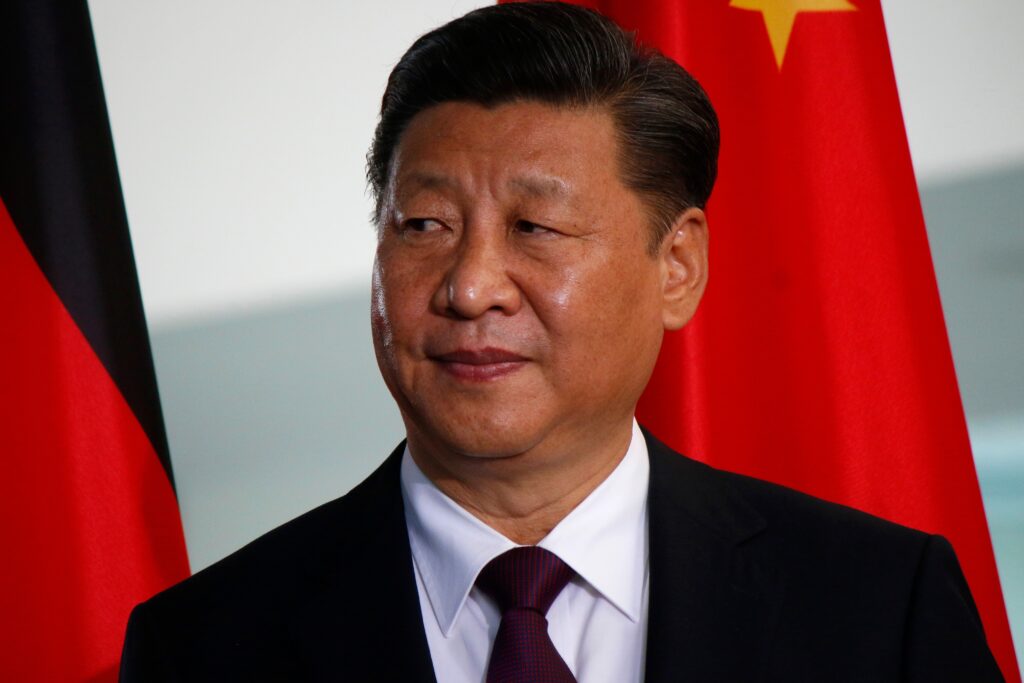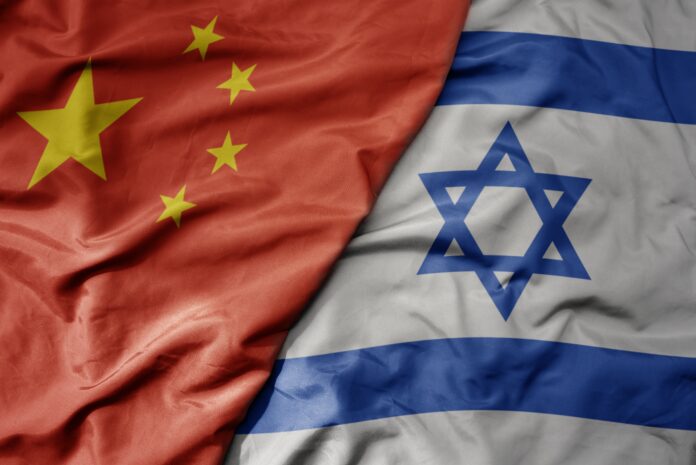Blogger Najm Al-Din argues that Muslims should not be fooled by China’s recent anti-Israel rhetoric as Beijing remains a key ally of Tel Aviv.
Throughout the War on Terror and Arab Spring, China avoided entanglement in Arab affairs and focused on maintaining the decades-long relationships with many authoritarian governments in the region.
And following the regime changes in Iraq, Egypt, Tunisia and Libya, Beijing reinforced the historically close ties with those countries, driven primarily by its economic interests in the region whilst maintaining a risk-averse approach to contentious Middle Eastern issues.
However, China’s recent condemnation of Israel’s genocide in Gaza represents a stark departure from Beijing’s previous neutrality towards Middle East conflicts.
The strident anti-Israeli tone amongst Chinese officials reflects Xi Jinping’s new foreign policy strategy, where far-flung conflicts are leveraged to accrue political capital and consolidate China’s strategic footprint in the Arab World whilst undermining its foremost rival, the U.S.
Amidst this shift in rhetoric and with the CCP calling for an end to Israel’s collective punishment of Gaza on the sidelines of a recently held BRICS summit, China’s calls for a ceasefire mustn’t detract from its important strategic relationship with Israel.
Technology
Subscribe to our newsletter and stay updated on the latest news and updates from around the Muslim world!
Soon after the establishment of full diplomatic relations between both countries, Israel’s status as a global technology hub was not lost on Beijing.
As China transitioned from a low-cost manufacturing giant to a high-tech economy, its government recognised that capitalising on Israel’s capabilities in the tech sphere could help the country meet its developmental needs.
Israel’s evolution from a start-up nation to an innovation hub partly explains China’s decision to court high-tech collaboration with Tel Aviv, granting it access to innovations in Artificial Intelligence, robotics and cybersecurity.
Over the past two decades, the formal rapprochement between both countries became more significant after growing concerns in Western nations over industrial espionage from China’s involvement in its tech sectors.
As China’s meteoric ascent fuelled its rivalry with the U.S., it was essential for the country’s conglomerates to curry favour with Israeli politicians as part of its competition with Washington to establish a sphere of influence in the Middle East.
With China being Israel’s largest East Asian trading partner and Israel ranking among the highest recipients of Chinese private and state-owned venture capital investments in technology, it’s no surprise that Netanyahu sees Israel as a crucial partner to help both nations solidify their status on the global stage.
Surveillance
The development of powerful AI ecosystems and in particular surveillance technologies is another crucial pillar of China-Israel relations.
Israel is monitoring Palestinians in the occupied territories with an intrusive database connected to smartphone apps and facial recognition cameras, echoing China’s repressive crackdown on Uighur Muslims.
According to Human Rights Watch, the Israeli Wolf Pack database which has a security profile and threat rating for every Palestinian in the West Bank mirrors China’s extensive data sources on the Turkic and Uighur populations, which are aggregated to compile social credit scores to determine the trustworthiness of citizens.
An Amnesty International report titled “Automated Apartheid” reveals that in places like Hebron and the Damascus Gate where demonstrations and social gatherings are often held, the movements of Palestinians are tracked and traced without their consent in vast biometric databases, much like the geo-fencing of Muslims in the heavily surveilled Xinjiang province.
With both countries having developed a draconian checkpoint regime to surveil Muslim populations, it is no coincidence that the vendors behind Israel’s surveillance tech apparatus happens to be Hikvision, a Chinese state-owned manufacturer and supplier of video surveillance equipment for civilian and military purposes.
Hikvision is Israel’s primary instrument of oppression of Palestinians in West Bank neighbourhoods and the illegal settlements and has also installed surveillance software in and around internment camps, schools and mosques in East Turkistan as part of a predictive policing system targeted at the Uighur Muslims.
In both countries, the use of ubiquitous AI-based surveillance systems architected by Chinese software engineers has impeded access to education, employment and healthcare for millions of Muslims and restricted their fundamental human rights including the freedom of movement and assembly.
Infrastructure
Being strategically located at the junction of three continents (Europe, Africa and Asia), Israel is also pivotal for the successful implementation of China’s BRI (Belt and Road Initiative), a sophisticated network of transcontinental railways and ports connecting Southeast Asia to central Europe and Africa.
Having recognised its geographic advantage, China has invested billions of dollars for more BRI projects in Israel compared to any other Middle Eastern country in the hopes of reviving the historic “Silk Road” trade route. As a vital conduit for China’s global power projection, China has undertaken large scale infrastructure projects across Israel’s energy and transportation sectors, ensuring the smooth functioning of Israel’s critical infrastructure.
These include the HaDarom Port Project, an important maritime gateway for the import and export of cargo which expands and modernises Israel’s second deepwater port. The tender for the project was awarded to China Harbour Engineering Company (CHEC) and is expected to accelerate the flow of trade into and out of Israel by offering accommodation for larger docking capacity, thus making Israel increasingly accessible to global trade.
Another major naval infrastructure project includes the cutting-edge Gulf Port in Haifa which will be capable of rapidly unloading huge vessels and significantly increasing maritime capacity, promising to bring prosperity to the economy of northern Israel. One of the world’s largest shipping managers-Chinese Shanghai International Port Group-was recently afforded a 25 year tender for the maintenance and operation of the port
These are just some examples of China-Israel cooperation enabling greater economic connectivity and efficient transportation, which I am expecting to accelerate in light of the increasing levels of congestion which shipping ports are experiencing worldwide.
New Middle East
With heightening tensions in the Red Sea threatening to sabotage transpacific shipments and disrupt a vital economic artery for the free flow of international trade, there is growing speculation that a new trading axis connecting Asia to Europe, known as IMEC (India-Middle East-Europe-Economic Corridor) will bypass China’s BRI, transform Israel into a key energy and logistical hub whilst securing Europe’s influence in the Gulf.
This “New Middle East” can convert Israel into a highly strategic outpost connecting the Indian Ocean and the Mediterranean Sea, marking Tel Aviv’s arrival on the scramble for Eurasia and breaking Egypt’s monopoly over transcontinental trade routes.

However, any de-risking from Beijing doesn’t imply a break between the Middle East and China, as Israel and its neighbouring Gulf monarchies would rather maximise the benefits which can be accrued by delicately balancing ties between both China and the Western powers and relying on globalised supply chains.
After all, Israel remains a highly attractive BRI market while Israel’s status as a gateway connecting Europe and the Middle East is inextricably tied to the railways and ports which China has been building over the past decade. IMEC is unlikely to reverse this dynamic.
Given Beijing’s energy dependence on the Middle East and the potential threat to its maritime trade in the Suez Canal, any broader regional spillover will persuade the CCP to assume a more prominent role as conflict mediator in the region.
It can also encourage Xi Jinping to pivot closer to Israel by converging China’s Afro-Eurasian integration project with Israeli maritime corridors which bypass the Suez.
As tensions escalate in the Sinai and blockades in the Red Sea plunge Egypt into a period of uncertainty, Israel will be deemed a more reliable maritime partner for reaching China’s European export market, offering faster navigation and avoiding a backlog of ships which we saw recently when a vessel’s bow got lodged in the eastern bank of the Suez resulting in the blockage of transit.
Multipolarity
In an increasingly fractured global order which increasingly favours a redistribution and realignment of global power, the overlapping strategic interests of Israel and China could radically restructure the international rules based order.
Given Washington’s receding strategic footprint on the world stage and the emergence of new power blocs such as BRICS as major drivers of global trade and investment, the return to multipolarity looks increasingly likely with a large concentration of financial and technological power converging in China and Israel as America’s status as the global hegemon par excellence begins to fade.
It begs a question. With Tel Aviv diversifying strategic partnerships to balance its reliance on Washington and having close relations with leading BRICS signatories such as Russia, India and China, will Israel’s strategic shift in foreign policy mean pivoting away from the U.S.?
At present, Israel remains deeply anchored to the U.S.-led security architecture in the Middle East as America continues to bear the military and financial costs to protect its interests in the region. Therefore, Washington’s growing apprehension towards Israel-Sino relations will naturally impose limits on such a partnership.
However, as American unipolarity begins to unravel and Israel slowly emerges from its status as a U.S. protectorate, such an alliance offers Tel Aviv a hedge against any potential U.S. retrenchment from the Middle East and uncertainty surrounding America’s long term willingness to act as a guarantor of Israel’s regional security.
Conclusion
With Beijing and Tel Aviv utilising their capital, technology and manpower to consolidate mutual interests, the Muslim world shouldn’t be duped by the CCP’s soft power strategy in the Middle East.
China’s underdog diplomacy vis-a-vis Palestine is not motivated by any aversion towards Israel but rather its antagonism towards the U.S. and desire to be seen as the voice of the Global South. It’s a carefully calibrated approach to avoid fallout with Arab regimes whilst maintaining strategic ties with Tel Aviv.
Ultimately, China and Israel have much more in common than they would like to admit. With Israel an important node in the New Silk Road and China being indispensable for Israel’s infrastructural needs, both countries are central to each others’ strategic calculus.
Furthermore, we cannot forget that both nations are complicit in the genocide of Muslim populations and are actively contributing towards the systematic erasure of Islamic culture, history and ideology.
























